What does chapter 7 even mean?
We hear it and read it all the time, “Chapter 7 bankruptcy.” But what does this term mean? The laws of the United States are recorded in what is known as the United States Code. These laws are divided into different titles and chapters. Chapter 7 of the bankruptcy code sets out the rules specific to the most common type of bankruptcy filed in Mississippi. This type of bankruptcy is a quick way to completely wipe out debts like credit cards, hospital bills, and payday loans.
“Liquidation bankruptcy?”
A Chapter 7 bankruptcy is often referred to as a “liquidation bankruptcy.” This description is a little misleading since most Chapter 7 filers are not required to liquidate any assets. Most individuals I represent, find that most, if not all, of their property is protected by state and federal exemption laws. Property protected by these laws is generally of the type that is needed to live and provide for one’s self and family. The property protected in a Chapter 7 is typically what is needed to help them make a fresh financial start. After all, to make a fresh start, you need something to start with.
What happens to assets that aren’t exempt?
In most bankruptcy cases the consumer’s assets will all be exempt and will not be subject to sale by the bankruptcy trustee. The bankruptcy trustee is a court appointed individual who collects and examines the debtor’s non-exempt property to decide whether there is anything to be collected and sold to pay creditors. The trustee sells property collected and then splits the proceeds between the creditors who are owed money by that individual. Often creditors are only paid pennies on the dollar for debts owed.
What about loans against my property?
It is common to have a loan against a home or a car. A debt backed by collateral, such as a house or car, is commonly referred to as a secured debt. Routinely individuals ask about keeping loans in place for houses and cars. With a chapter 7 bankruptcy there are several options for dealing with secured debts – Reaffirmation, Redemption and Surrender.
Reaffirmation
Reaffirmation is a voluntary agreement to keep paying a particular debt. You are reaffirming a particular debt you already had before the bankruptcy. This choice is typically made to keep ownership in the asset secured by that debt (i.e. reaffirming your car note so that you can keep the car). When you reaffirm a debt you still owe the debt after the bankruptcy just as you did before. The creditor continues to have a lien against the property secured by the debt and your personal liability remains as to the debt reaffirmed.
Redemption
Redemption is another way to keep property. Although redemption is not always an option, it is a process where a lump sum is paid to the trustee for property at its current value. Often times the current value of your property is much lower than what you owe on it. Redemption allows you to keep property that would otherwise be sold by paying what the property is actually worth rather than the total amount owed for the property.
Surrender of collateral
If you want to give up the asset and wipe out the debt you can surrender the collateral or turn it over to the lender. In a Chapter 7 this wipes out your obligations on that debt. In other words, you can walk away from secured loans owing nothing.
Deciding whether to reaffirm, redeem or surrender secured debts is different in every individual’s situation. An experienced attorney can help you decide what works best for you for each of your secured debts.
Will I have to go to court? No, but . . .
In the vast majority of Chapter 7 filings, the consumer does not have to appear in a courtroom before a judge. Filers do, however, have to go to the courthouse to attend what is known as the meeting of creditors. At this meeting a trustee is able to ask the consumer questions under oath. Typically these questions relate to the accuracy of the schedules filed and reaffirmation of debts. While this is a serious proceeding, it is relatively informal when compared to a full-blown court appearance.
Not everyone is eligible to file under Chapter 7 of the bankruptcy code
Some individuals are automatically eligible for a chapter 7, such as certain disabled veterans and individuals meeting certain debt criteria. For most, eligibility for a Chapter 7 is determined by what is called the “means test.” This calculation looks at your household income and expenses to determine whether Chapter 7 is an option. There are also restrictions that limit how often you may file for bankruptcy. Your ability to file a Chapter 7 may be limited by prior bankruptcy filings. Even if Chapter 7 is not an option, you likely have other good options for relief under the bankruptcy code.
What happens at the end of a Chapter 7 bankruptcy?
At the end of a Chapter 7 bankruptcy the eligible debts of the filer are discharged. In other words, they are legally wiped out and are no longer owed. Debts that are not dischargeable, such as child support obligations and alimony, are not wiped out. There are also some debts that are only dischargeable under certain circumstances such as student loans and taxes. Most debts, such as credit card debt and medical bills do not fit within these categories, and are wiped out at the end of a Chapter 7 bankruptcy. In a typical case, most debts are eliminated, allowing the debtor to get a fresh start in their financial life.
We’re here to help! If you live in Central Mississippi and are interested in learning how Chapter 7 Bankruptcy may apply in your specific situation, please feel free to call us at 601-853-9966.
